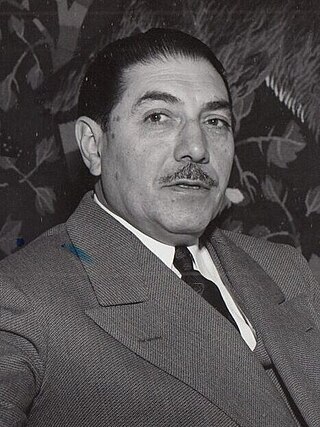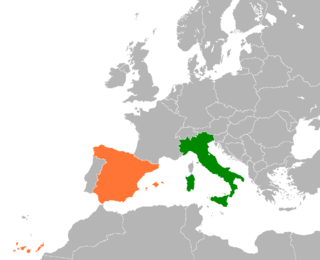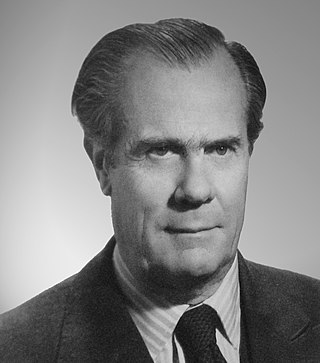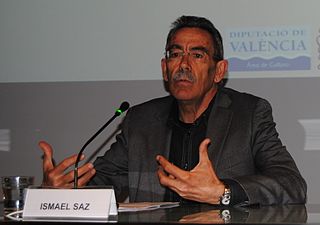
Francoist Spain, also known as the Francoist dictatorship, was the period of Spanish history between 1936 and 1975, when Francisco Franco ruled Spain after the Spanish Civil War with the title Caudillo. After his death in 1975, Spain transitioned into a democracy. During this time period, Spain was officially known as the Spanish State.

Carlos Arias Navarro, 1st Marquess of Arias Navarro was the prime Minister of Spain during the final years of the Francoist dictatorship and the beginning of the Spanish transition to democracy.

The Spanish transition to democracy, known in Spain as la Transición or la Transición española, is a period of modern Spanish history encompassing the regime change that moved from the Francoist dictatorship to the consolidation of a parliamentary system, in the form of constitutional monarchy under Juan Carlos I.

The Falange Española Tradicionalista y de las Juntas de Ofensiva Nacional Sindicalista, frequently shortened to just "FET", was the sole legal party of the Francoist regime in Spain. It was created by General Francisco Franco in 1937 as a merger of the fascist Falange Española de las JONS with the monarchist neo-absolutist and integralist Catholic Traditionalist Communion belonging to the Carlist movement. In addition to the resemblance of names, the party formally retained most of the platform of FE de las JONS and a similar inner structure. In force until April 1977, it was rebranded as the Movimiento Nacional in 1958.

Luis Padilla Nervo was a Mexican politician and diplomat. He was the first Mexican Ambassador at the United Nations, Minister of Foreign Affairs and President of the Sixth Session of United Nations General Assembly.

Israel and Spain have maintained diplomatic ties since 1986. Israel has an embassy in Madrid. Spain has an embassy in Tel Aviv, and an honorary consulate in Haifa. There is also a General Consulate in Jerusalem, which serves as a diplomatic mission to the city of Jerusalem, Gaza and the territories of the West Bank. In addition to both countries being member states of the United Nations, both countries are members of the Union for the Mediterranean.

Italy–Spain relations are the interstate relations between Italy and Spain. Both countries established diplomatic relations some time after the unification of Italy in 1860.

Mexico–Yugoslavia relations were historical foreign relations between Mexico and now split-up Socialist Federal Republic of Yugoslavia. Mexico and Yugoslavia established diplomatic relations on 24 May 1946 on the initiative of the President of Yugoslavia Josip Broz Tito. Both countries shared their views on Francoist Spain and cooperated with the Spanish Republican government in exile. On 31 July 1952 the two countries protested strongly against a decision of a United Nations committee to ask the Franco Government what it might be able to do to strengthen the collective security.
Arriba was a Spanish daily newspaper published in Madrid between 1935 and 1979. It was the official organ of the Falange, and also of the regime during the Franco rule in the country.

Modesto Seara Vázquez was a Spanish-born Mexican jurist and academic. He lived in several countries but has spent most of his life in Mexico. He has actively participated in Mexican life as a professor at the National Autonomous University of Mexico and since 1988 as the Rector of the Oaxaca State University System in the State of Oaxaca. He died in Mexico City on 26 December 2022, at the age of 91.
Events in the year 1946 in Spain.

The Spanish question was the set of geopolitical and diplomatic circumstances that marked the relationship between Spain and the United Nations between 1945 and 1955, centred on the UN's refusal to admit Spain to the organization due to Francoist Spain's sympathy for the Axis powers, defeated in World War II.

José Solís Ruiz was a Spanish politician, known for his role in Francoist Spain, during which he occupied a number of important posts.

Eduardo Alejandro Roca was an Argentine lawyer, academic, and diplomat. He was Ambassador of Argentina to the United States (1968–1970) and was appointed as a permanent representative to the United Nations during the 1982 Falklands War.

Spain–Syria relations are the bilateral and diplomatic relations between these two countries. Syria has an embassy in Madrid. Spain has an embassy in Damascus. Both countries are charter members of the Union for the Mediterranean, although Syria suspended its membership in 2011.

The mottos of Francoism are mottos which encapsulate the ideals of the Francoist dictatorship. Although the regime had many ideological influences, it employed Falangism in its popular movements. Falangist ideology was easily incorporated in the creation of mottos as it is believed to demonstrate a certain reluctance towards political agendas, and to favour empiricism, taking action, and the simplification of ideas.

Ismael Saz Campos is a Spanish historian, specialised in the study of Falangism, Francoist Spain and the Spanish-Italian relations during the Spanish Civil War. He is a professor at the University of Valencia.

The Línea P, officially the Pyrenees Defense Organisation, was a fortified line of defense built in the Pyrenees between 1944 and 1948 to prevent an invasion into Spanish territory.

Egriselda López is a Salvadoran diplomat.
The Permanent Representative of Argentina to the United Nations is the official representative of the government of Argentina to the United Nations.


















